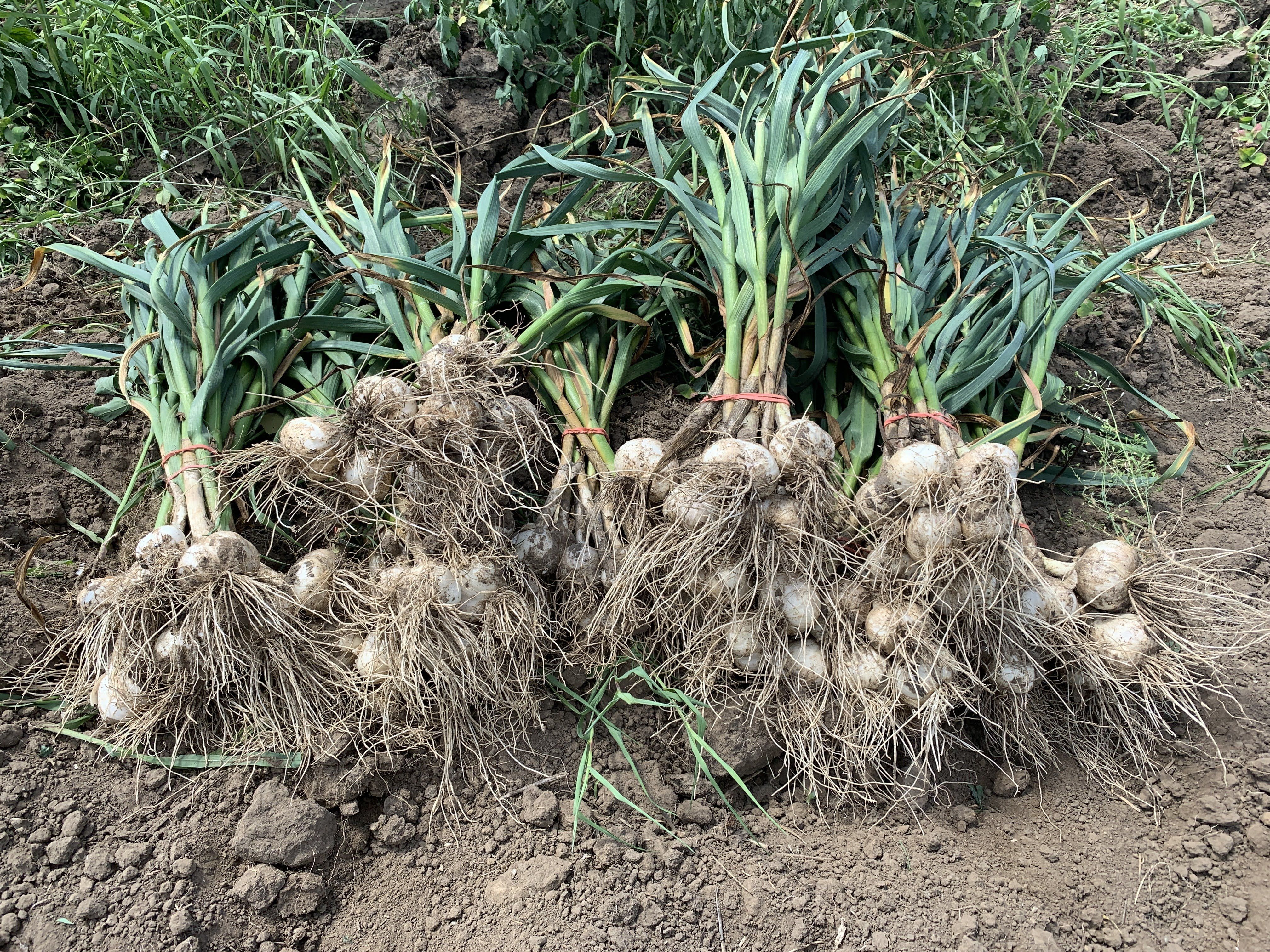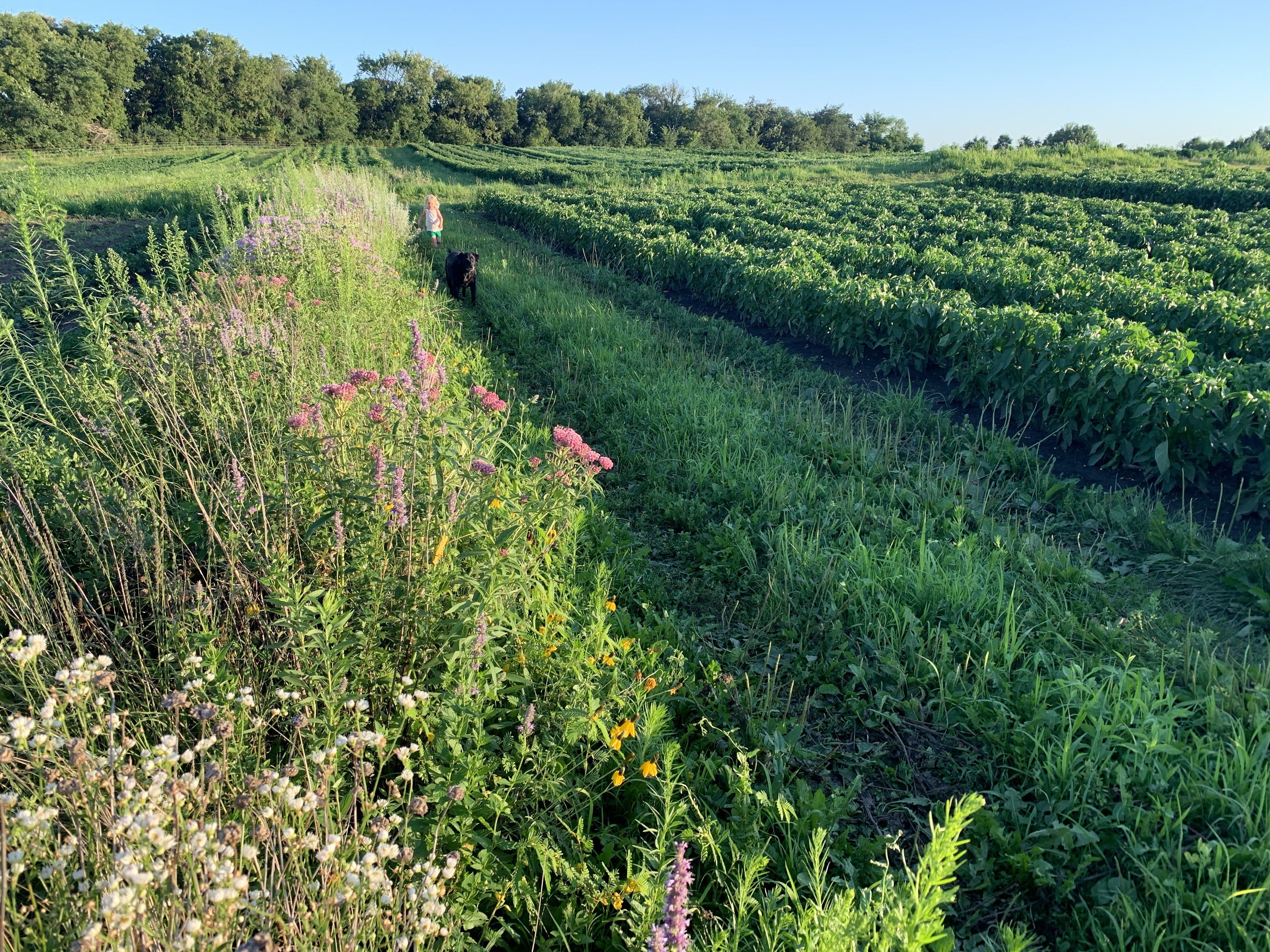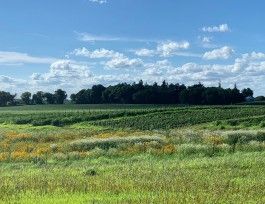Crop and Farm Update
It was a week of lovely sunny and moderately warm weather. Perfect weather, from nearly any perspective. Yet here at the farm, we are still starved for moisture, having now gone four weeks without more than a drizzle. That means we've been spending lots of extra time managing irrigation to keep crops going. The frustrations with faulty irrigation pipe gaskets we mentioned in last week's newsletter continued all week, but on Friday, we had a small victory. We now have a compromise irrigation setup functioning - not what we had originally planned, but still an improvement from our old system. We are hoping for no more irrigation drama for the rest of the season. Hopefully some rainfall, actually!
We harvested a few ripe cantaloupes and watermelons at the end of the week - my favorite part of the harvest season. While the watermelon crop is looking lush and healthy, I'm afraid I have some "harsh reality" to report to members, as well. We have a new pest that's wreaking havoc in the watermelons for the first time in our farm's history - coyotes. Never before have I thought of them as a crop pest, but they've been walking through the field, scratching at fruits until they find a ripe one they like, then puncturing a hole in the top and eating down to the heart of the fruit.

Between the scratched and the punctured fruits, I estimate we've lost well over 200 fruits from our early maturing varieties. There would have no doubt been watermelon to offer in this week's shares, but I genuinely don't know whether we will have any uneaten given the coyote problem. So we've left it out of this week's offerings.
We installed double strand electric fencing around the fields, but they seem to still be getting in. I'm afraid the only way we may be able to protect the crop is to have someone patrol the field at night with a firearm. Haven't figured out the feasibility of that just yet, but are seriously considering it lest we want to risk losing our entire crop.
Next week should see harvest of the majority of our onion crop and subsequent curing in the greenhouse. We are also on the precipice of wholesale pepper harvest beginning. Some of you know that we grow lots of peppers - primarily hot varieties like Anaheim, jalapeno, habanero, and specialty superhots like scotch bonnet and Carolina Reaper. These go to local hot sauce makers like Double Take Salsa, Cry Baby Craig's, and Lucky's Sauces. Once these fields are ready to harvest, we'll be harvest and washing thousands of pounds per week, bringing a big spike in labor needs. Some of this work will be done by our crew, but much will be done with the help of a contract crew from St. Paul's Hmong community. They've become a lynch pin to the success of our wholesale pepper production and we're grateful for our relationship with them. It's an exciting time of year!
Crew Bios

(Written by postharvest manager, Sarah Lang)
Je’Amy joined our team early this spring because she was interested in seeing where her food comes from, and she wanted to be engaged with the local food system. She had been working abroad in Guatemala when Covid hit and came home just before the borders were closed. She’s been a big part of the farm, stepping up as my Farm Share pack partner. She’s been personally responsible for triple washing all of your salad greens, spinach, and microgreens. Uff da! I’m grateful for her attention to detail and outstanding work ethic.
When not farming she enjoys photography, watching educational YouTube videos, singing, and backpacking with her dogs. In a few weeks she’ll be off to Northland College to pick up studying Natural Resources and Sustainable Ag and Food Systems. She’s considering having her own produce farm in the future on her family’s land. Favorite produce item? Rhubarb for rhubarb crisp
Notes on items in this week's box
- Sweet onions are not cured, but they're starting to dry down a bit in the field. Treat them as fresh (store in the fridge rather than the cupboard).
- Cucumbers are showing some cucumber beetle damage on the skins. The slicer cucumbers have fairly thick skins that are best peeled, anyway, so this would be removed prior to use. The only way to prevent this damage would be to spray insecticide, and we try to avoid doing so especially on flowering plants like cucumbers where pollinators are present.
- Summer squash/zucchini this week may receive some fruits that are a little larger than what we've sent in prior weeks. They're by no means giant and can be used in all the normal ways. But they'd also be good candidates for zucchini bread if that's your thing. Larger fruits will be valued lower, so you'll get more weight in your box if receiving larger fruits.
- Tomatoes - we are aiming for ~2 lbs per bag for slicer types and ~1.5 lbs per bag for heirlooms. We are trying to gauge how many fruits will ripen by next Tuesday, so it's a gamble. Last week we came up a little short of our goal, so volumes in bags were lower than we had planned. Combining slicers and heirlooms in the same bag was quite labor intensive, so this week we're going to an either/or plan this week. We are about a week away from full production in our tomato plantings.
- We are excited about the return of salad mix this week. We row covered to protect from deer, but it has been through lots of heat and received less water than we'd like. We'll taste test each variety to avoid harvesting anything that's very bitter, bit there may be bitter notes in some varieties, as is common with midsummer lettuce.
Have a great week (and continue doing your rain dance for us),
Dana




